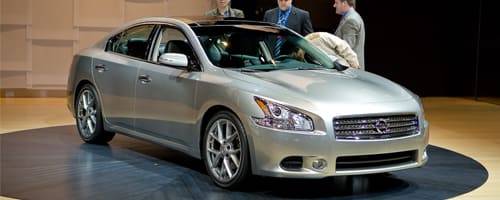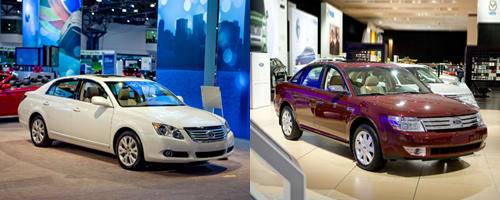Do Large Sedans Have Big Future?


In an age when crossover SUVs and fuel-sipping small cars are all the rage, some may wonder why automakers still pursue large, relatively gas-thirsty sedans. No slowdown is in sight: Ford reportedly will debut a redesigned Taurus early next year, and Nissan took the wraps off its seventh-generation Maxima at last week’s New York auto show.
That’s in spite of the fact that the market for such cars is stalling: J.D. Power reports that large-car sales dropped 21% over the past two months. Automakers are committed to sticking it out because they say the cars represent flagships for their brands, and they’re confident the road ahead won’t be quite so rough.

Auto analyst Erich Merkle backs up that stance. Despite the ebbing popularity of cars like the Chrysler 300 and Toyota Avalon, he predicts large cars will rebound as baby boomers retire.
“They’re never going to look for their father’s vehicle,” he said, but they will go for “well-styled, large cars with all the modern amenities.” The Maxima satisfies some of those criteria: Its trunk and cabin aren’t as roomy as those in a Taurus or Avalon, but it can come stocked with things like a heated steering wheel and panoramic moonroof.
With such features, some wonder whether the Maxima encroaches on the turf of its luxury sibling, Infiniti. At the auto show, Nissan general manager Al Castignetti acknowledged the risk but said it’s all part of “getting people to move on up.”
Merkle sees the door swinging the other way: Baby boomers could move down, crossing from a higher-end Lexus to a loaded Toyota Avalon, for instance. Baby boomers “are looking for value,” he said.
“You’ll see a shift more away from luxury and more toward your bread-and-butter brands,” he said.
Toyota product administrator Damien White said his company is also mindful of the risk, but that there’s still ground to claim between a midsize family car and an entry-level luxury car. Average transaction prices illustrate his point: Entry-level luxury cars like the Lexus ES run near $37,000, while midsize family cars like the Camry and Accord are around $24,000, White said. The Avalon runs $31,800 — almost exactly halfway between.
Risks notwithstanding, these cars will likely stick around because of the flagship factor. In its initial press release, Nissan affirmed the redesigned Maxima’s flagship status, and White said the Avalon is still “definitely” Toyota’s flagship — despite the automaker having a Land Cruiser SUV that costs twice as much and a Prius that’s become the icon of hybrids. Keep that in mind and you can bet that no matter which way car buyers go, automakers won’t easily leave the full-size sedan behind.

Former Assistant Managing Editor-News Kelsey Mays likes quality, reliability, safety and practicality. But he also likes a fair price.
Featured stories




